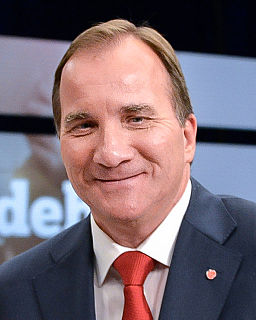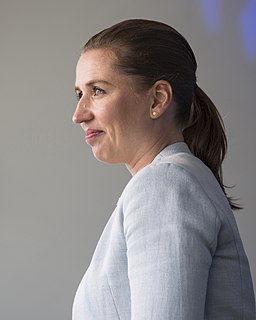The politics of Greenland, a "constituent country" of the Kingdom of Denmark, function in a framework of a parliamentary representative democratic dependency, whereby the prime minister is the head of government, and of a multi-party system. Executive power is exercised by the government. Legislative power is vested in both the government and parliament Inatsisartut. The judiciary is independent of the executive and the legislature. Greenland has full autonomy on most matters, except on policies and decisions affecting the region including negotiations with the devolved legislatures and the Folketing.
Being part of the Kingdom of Denmark, the foreign relations of Greenland are handled in cooperation with the Danish government and Government of Greenland.

The Prime Minister is the head of government in Sweden. Before the creation of the office of a Prime Minister in 1876, Sweden did not have a head of government separate from its head of state, namely the King, in whom the executive authority was vested. Louis Gerhard De Geer, the architect behind the new bicameral Riksdag of 1866 that replaced the centuries-old Riksdag of the Estates, became the first officeholder in 1876.

The Prime Minister of Denmark is the head of government in the Kingdom of Denmark comprising the three constituent countries: Denmark, Greenland and the Faroe Islands. Before the creation of the modern office, the kingdom did not initially have a head of government separate from its head of state, namely the Monarch, in whom the executive authority was vested. The Constitution of 1849 established a constitutional monarchy by limiting the powers of the Monarch and creating the office of premierminister. The inaugural holder of the office was Adam Wilhelm Moltke.
Siumut is a social-democratic political party in Greenland. The party was an observer affiliate of the Socialist International. Siumut is led by the current Greenlandic Premier Kim Kielsen. Until September 2014 it was led by Aleqa Hammond, who was the first woman to lead the party.

The Folketing, also known as the Danish Parliament in English, is the unicameral national parliament (legislature) of the Kingdom—Denmark proper together with the Faroe Islands and Greenland. Established in 1849, until 1953 the Folketing was the lower house of a bicameral parliament, called the Rigsdag; the upper house was Landstinget. It meets in Christiansborg Palace, on the islet of Slotsholmen in central Copenhagen.

The flag of Iceland was officially described in Law No. 34, set out on 17 June 1944, the day Iceland became a republic. The law is entitled "The Law of the National Flag of Icelanders and the State Arms" and describes the Icelandic flag as follows:
The civil national flag of Icelanders is blue as the sky with a snow-white cross, and a fiery-red cross inside the white cross. The arms of the cross extend to the edge of the flag, and their combined width is 2⁄9, but the red cross 1⁄9 of the combined width of the flag. The blue areas are right angled rectangles, the rectilinear surfaces are parallel and the outer rectilinear surfaces as wide as them, but twice the length. The dimensions between the width and length are 18:25.

The Inatsisartut, also known as the Parliament of Greenland in English, is the unicameral parliament of Greenland, a autonomous country in the Danish realm. Established in 1979, it meets in Inatsisartut, on the islet of Nuuk Center in central Nuuk.
The Cabinet of Denmark has been the chief executive body and the government of the Kingdom of Denmark since 1848. The Cabinet is led by the Prime Minister. There are around 25 members of the Cabinet, known as "ministers", all of whom are also heads of specific government ministries. The Cabinet has usually been composed of Ministers from two or more parties forming a coalition government. Still, most of these governments have been minority governments, relying on the support of still other parties.

Claus Hjort Frederiksen is Danish Minister for Defence since November 2016. He was Minister for Finance from June 2015 until November 2016, having previously served in same capacity from 7 April 2009 to 3 October 2011, as member of the Lars Løkke Rasmussen I Cabinet. From 2001 to 2009, he was Minister of Employment of Denmark in cabinets I II, and III of Anders Fogh Rasmussen. He is a member of the liberal party Venstre. He has been a member of parliament (Folketinget) since the 2005 Danish parliamentary election.

The Ministry of Foreign Affairs of Denmark and its overseas representations are in charge of the Kingdom of Denmark's foreign policy and relations. Among these tasks are policy towards the Arctic Council, European Union, Nordic Council, development aid, trade policy and legal affairs in relation to the outside world.

Education Minister of Denmark, or Minister of Education in Denmark, is a Danish minister office currently held by Merete Riisager.

The Danish Defence Intelligence Service (DDIS), is a Danish intelligence agency, responsible for Denmark’s foreign intelligence, as well as being the Danish military intelligence service. DDIS is a department under the Ministry of Defence and works under the responsibility of the Defence Minister of Denmark. It is housed at Kastellet in Copenhagen.

The Cabinet of Iceland is the collective decision-making body of the government of Iceland, composed of the Prime Minister and the cabinet ministers.

The term "the unity of the Realm" refers to the relationship between Denmark proper, the Faroe Islands and Greenland—the three countries constituting the Kingdom of Denmark.

Lars Løkke Rasmussen is a Danish politician who is serving as the 25th Prime Minister of Denmark since 2015. He previously also held the office from 2009 to 2011. He has been the leader of the liberal Venstre party since 2009.

KANUKOKA is the national association of Greenland's municipalities, led by Palle Jeremiassen. The name is an acronym formed from the first two letters of each of the constituent words of the organization's name in the Greenlandic language.
Dan Michael Knudsen was the High Commissioner of the Faroe Islands until 2017. Knudsen was appointed to the office in 2008, succeeding Søren Christensen. He previously worked in the Department of Finance in the Faroese home rule government, 1997–2000:
















